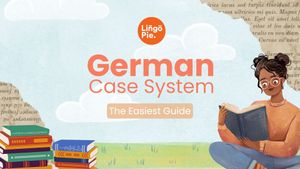If you're eager to embark on a captivating journey into the German language and culture, there's no better way to do it than by learning German with TV.
This dynamic approach not only enhances your language skills but also immerses you in the diverse world of German entertainment.
From gripping crime dramas like "Tatort" (Crime Scene) to historical epics exploring German history and the Berlin Wall, the realm of German television offers a rich tapestry of genres and narratives.
Whether you're interested in unraveling mysteries, indulging in comedy, or delving into the past, German TV has something for everyone.
By watching German TV shows with subtitles or switching to the German audio track, you can improve your language skills, expand your vocabulary, and even get a taste of the authentic North and South German accents.
Plus, immersing yourself in these shows provides invaluable exposure to native speakers and cultural nuances, making your language learning experience both enjoyable and effective. So, get ready to explore the world of "Deutsche Fernsehen" and take your German proficiency to new heights.

1. Watch Kids TV Shows
Kids TV shows are incredibly valuable for beginner German learners for several compelling reasons.
First and foremost, these German shows are designed with simplicity in mind, featuring straightforward language, clear pronunciation, and slower speech patterns.
This makes it easier for newcomers to grasp the fundamentals of the language, including basic vocabulary, grammar, and sentence structure.
Moreover, kids TV shows often incorporate repetition and reinforcement, which are key learning strategies.
Children's programs revisit core concepts and phrases, reinforcing them through catchy songs, playful dialogues, and engaging storylines. This repetition is proven to be an aid in memory retention and comprehension.
Additionally, the visual elements in kids TV shows provide context and aid in understanding, even when the viewer may not yet be proficient in the language. The combination of visuals and spoken language enhances overall comprehension, making it easier for beginners to connect words with their meanings.
Overall, kids TV shows in German create a fun, low-pressure learning environment that helps beginner learners build a strong foundation in German while enjoying entertaining and age-appropriate content.
To learn German effectively using kids' shows, Lingopie kids is an excellent platform to consider. Begin by signing up and searching for renowned German children's series, which often employ basic language ideal for newcomers. While watching, utilize Lingopie's interactive subtitles to click on unfamiliar words or phrases for on-the-spot translations. Enhance your pronunciation by echoing lines from the shows, and immerse yourself in the context to appreciate cultural references and real-world language usage. As you progress, try turning off the English subtitles to fully engage with the German audio, and revisit episodes to solidify your understanding.

2. Use German Subtitles when watching German TV shows

One of the most effective ways to learn German while watching TV is to use German subtitles.
On the Lingopie platform, you can use a dual-subtitle feature, or select German subtitles only. By enabling German subtitles, you can listen to the dialogue while simultaneously reading the corresponding text, as well as study these words or phrases in context.
This reinforces your listening comprehension, helps you identify the correct pronunciation of words, and aids in understanding context.
Lingopie offers a wide selection of German TV shows and series with this dual-subtitle feature. You can even use the dashboard to select most popular depending on what other German learners recommend.
If you watch German TV shows using the Lingopie platform, learning German phrases and new vocabulary is an inevitability.
Whether you're into crime dramas like "Tatortreiniger" (Crime Scene Cleaner) or German series that cater specifically to learners, Lingopie has a diverse range of content to choose from.
Watching TV with Lingopie's German subtitles will not only enhance your language skills but also keep you engaged with compelling narratives.
Related:

3. Use Language Learning Apps
To make the most of your German TV learning experience, consider utilizing language learning apps, which help you to learn in a fun and engaging way.
These apps offer interactive exercises and quizzes tailored to popular German TV shows, enhancing your comprehension and vocabulary.
Whether you're exploring gripping crime series, historical dramas, or shows designed for German learners, language learning apps can complement your viewing.
Like Lingopie, apps often include features like flashcards, pronunciation guides, and quizzes related to the German TV series you're watching. By using them, you can reinforce your language skills while enjoying your favorite TV programs.
Read Also:

4. Start with English Subtitles and Transition to German
If you're just beginning to learn German with TV, starting with English subtitles can be a helpful stepping stone.
This approach provides a safety net as you familiarize yourself with the language and the storyline. This is important, because it's always easier to acquire new vocabulary when you see how it's used in context.
English subtitles allow you to follow the plot, understand character interactions, and understand the scenes.
As you become more comfortable, consider transitioning to German subtitles or, ideally, watching without any subtitles. This gradual shift allows you to challenge yourself and improve your listening comprehension.
You'll begin to recognize familiar words and phrases, and your understanding of spoken German will grow. This method not only makes the transition smoother but also builds your confidence in understanding and speaking German in real-life situations.
As previously mentioned, remember that with Lingopie you can also make use of the dual-subtitle feature.
5. Take Notes on New Vocabulary

When immersing yourself in German TV shows, it's essential to engage with the content as much as you can.
One effective technique is to take notes on new vocabulary that you encounter during your viewing. Write down unfamiliar words, idiomatic expressions, or phrases that pique your interest.
If you are a visual learner, you'll certainly benefit from creating a written vocabulary list, in addition to the list you can store on the Lingopie platform.
After watching an episode, review your notes, look up the meanings, and practice using these words in written and spoken sentences. This active approach reinforces your memory and helps you retain the new vocabulary.
In fact, it takes you from being reactive to being proactive, and this mix is always healthy when you're learning German, or any other foreign language.
Additionally, keeping a vocabulary journal can be a useful reference for future German language endeavors. By consistently taking notes on new words, you'll expand your German lexicon and enhance your overall language skills.
6. Discuss Episodes with Others in German

Engaging in discussions about TV shows in German can be an enjoyable and effective way to improve your language skills.
Whether you're watching dramas set in West Germany, exploring the German version of a series, delving into aspects of German culture, or even discussing historical events like East German soldiers, conversations about TV shows can cover a wide range of topics.
Try to find conversation partners on platforms like Tandem, or join online forums on platforms like Reddit, where people share your interest in watching TV shows in German.
Discussing episodes, characters, and plot developments in German allows you to practice speaking and listening in a relaxed, real-life context.
It also exposes you to different accents and colloquial language, enriching your understanding of the language's nuances.
By conversing in German about the TV shows you love, you'll not only enhance your language skills but also connect with fellow learners and enthusiasts, making your language journey all the more enjoyable.
FAQs: How to Learn German with TV
Discover effective strategies, tips, and answers to common queries on incorporating television into your German language learning journey.
From using subtitles to selecting the right shows, this section answers frequently asked questions from German learners like you.
Can you learn German by watching TV?
Yes, you can learn German by watching TV. It's an effective method to improve listening comprehension, expand vocabulary, and familiarize yourself with native accents and cultural nuances.
Is it possible to learn German by watching movies?
Absolutely, watching movies in German is a valuable learning tool. They offer immersive language exposure, diverse vocabulary, and insights into German culture and society.
Can I learn German with Netflix?
Yes, you can learn German with Netflix. The platform offers a variety of German-language content, including shows, movies, and documentaries, providing an enjoyable and flexible way to enhance your language skills.
What is the best way to learn German on your own?
The best way to learn German on your own involves a mix of resources: watching TV and movies, using language apps, reading books, practicing with native speakers, and immersing yourself in daily life situations where you can apply the language. Tailor your approach to your preferences and goals.
Summing Up: How to Learn German with TV
Learning German with TV is a dynamic and engaging approach that offers a multitude of opportunities for language growth.
Whether you're drawn to gripping crime scenes, exploring German history, or simply enjoying the entertainment value of TV shows, there are numerous ways to harness this medium for language learning.
By using German subtitles, such as those provided by Lingopie, you can improve your listening comprehension, pronunciation, and overall language skills while immersing yourself in captivating narratives.
Furthermore, starting with English subtitles and transitioning to German provides a gradual and effective way to boost your confidence in understanding and speaking the language.
Taking notes on new vocabulary encountered during your TV adventures helps expand your lexicon, while discussing episodes with others in German provides real-world practice and enriches your cultural understanding.
So, embrace the world of German TV and let it be your educational gateway to mastering this fascinating language.
It's a journey that promises both linguistic growth and a deeper appreciation for German culture and storytelling.


![Learn German with TV [6 Effective Techniques]](/blog/content/images/size/w1200/2023/09/Spanish-1-14.png)


![The Cheat Code to Learn Japanese With Movies [For Beginners]](/blog/content/images/2023/10/Spanish-1.png)


![7 Best Apps To Learn German On Your Own [REVIEWED]](/blog/content/images/size/w300/2026/01/best-apps-to-learn-german-on-your-own.png)
![6 Best German Translator Apps For Beginners [TESTED]](/blog/content/images/size/w300/2026/01/Best-german-translation-apps-for-beginners-.jpeg)
